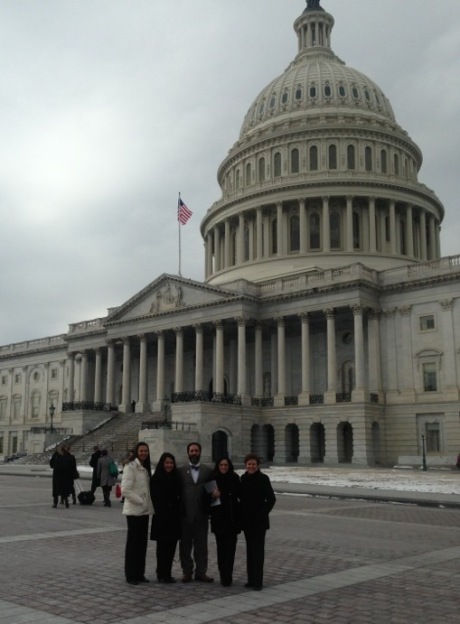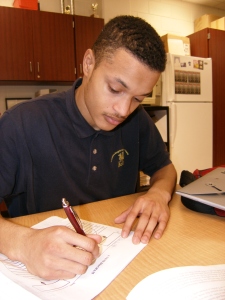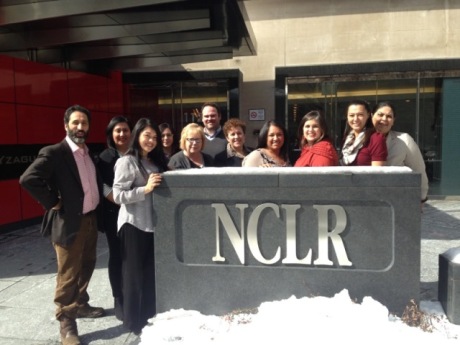Speaking Truth to Power April 1, 2014
Posted by latinoschoolleaders in Education Policy.Tags: college and career readiness, Congress, education advocacy, George Miller, Lamar Alexander, Latino leadership, NCLB, No Child Left Behind, Tom Harkin
add a comment
By Angelica Solis, Director, Youth Policy Institute
 Our national leaders are charged with some heavy responsibilities: representing the community’s interest and ensuring that that representation reflects national policy. This is easier said than done. Competing community interests, disconnect between local realities and national perceptions, insufficient information about specific topic issues, and many other factors often challenge our leadership’s ability to develop policies that address the specific needs of Latino students and their families. For this reason, it is important that school and community leaders working directly with Latino communities actively engage policy makers around the issues that are vital to supporting the students and families they work with.
Our national leaders are charged with some heavy responsibilities: representing the community’s interest and ensuring that that representation reflects national policy. This is easier said than done. Competing community interests, disconnect between local realities and national perceptions, insufficient information about specific topic issues, and many other factors often challenge our leadership’s ability to develop policies that address the specific needs of Latino students and their families. For this reason, it is important that school and community leaders working directly with Latino communities actively engage policy makers around the issues that are vital to supporting the students and families they work with.
Informing and educating policy makers and their staff about important education issues such as NCLB waivers, college and career readiness standards, family engagement, and mental health, is critical to ensuring that Latino voices and experiences are not lost as our national legislators craft policies that will impact our community. Most importantly, having policy makers hear first hand the stories of how education policies play out locally, allows them to put faces to the issues and to contextualize the statistics and data that may or may not accurately capture the impacts of these policies in our communities.
On March 6, the current cohort of NCLR’s National Institute for Latino School Leaders (NILSL) had an opportunity to do just that – share their local stories, experiences and expertise around these and several other key issues impacting Latino students and families across the country. The NILSL fellows had the chance to meet with representatives from high-ranking legislative leaders such as Senator Tom Harkin (D-Iowa), Senator Lamar Alexander (R-Tenn.), Congressman George Miller (D-Calif.), and others, that are currently leading discourse and developing policies that impact our educators, schools, students and families. NILSL participants shared first-hand accounts of how their schools can use resources to support teacher development; how realignment of existing funds can impact a school’s ability to provide mental health resources to the child that has to overcome the traumas of living in a gang-infested neighborhood; and how developing clear accountability measures can ensure local schools are held accountable for erasing the achievement gap.
These were the stories the NILSL fellows carried with them as they walked the halls of Congress and met with the staff of the powerful leaders that will make decisions that impact their communities. Equipped with these stories as well as the hard facts and data related to the issue topics, the school and community leaders were unwavering in their commitment to the share the key recommendations that will ultimately lead to improved student outcomes, safe and healthy school environments, and improved community and family engagement.
Without the voices of local school and community leaders in Washington D.C., our leaders’ job of representing our Latino community interests will be difficult to fulfill, and it is in our best interest that they are successful at what they do so that our communities can be successful in return.
Preparing Our Students for 21st Century and College and Career Readiness Standards April 1, 2014
Posted by latinoschoolleaders in College Readiness.Tags: 21st Century Learning Standards, Career Readiness Skills
add a comment
By Janet Alvarez, Principal, Para Los Ninos Middle School
 I was recently asked what I think the most important aspect is to prepare our Latino students for the rigor of 21st Century Learning and College and Career Readiness Standards. As I thought about it, it isn’t the arts, literacy, science, technology, or math that we integrate into every content area. Rather, it is the inquiry and curiosity that we nurture, demonstrate and practice through our approach.
I was recently asked what I think the most important aspect is to prepare our Latino students for the rigor of 21st Century Learning and College and Career Readiness Standards. As I thought about it, it isn’t the arts, literacy, science, technology, or math that we integrate into every content area. Rather, it is the inquiry and curiosity that we nurture, demonstrate and practice through our approach.
Our students are curious about the world around them, hungry for more information about why things work the way they do and how to make them work even better. This curiosity is what ignites a thirst for learning in our students and energizes them to be innovative thinkers.
Typically, 21st Century and College and Career Readiness Skills, are referred to as; critical thinking, communication, creativity and collaboration. These skills are extremely important, and the structure and tools to practice them in school are crucial.
I would like to add two more “C’s” to that list: curiosity and confidence.
Curiosity is a student’s fundamental motivation for learning. Without it, students would never wonder, never question, and never try again after failing. Our students need to see curiosity in action through demonstration. They need the time, structure, and devices to guide their curiosity into inquiry, exploration and learning. They also need meaningful ways to reveal their innovations, challenges and thoughts along the way.
Building confidence in our students is one of the most powerful “C’s” of all. Acknowledging student accomplishments privately, and in front of a group boosts their belief in their capabilities. Further, allowing students the opportunity to self-select their own activities will help them build their self-worth.
Encourage students, when they are performing a task or getting involved in an activity, to do better than they did before, NOT better than someone else! And finally, express a positive attitude toward our students so they see that they are worth your time and attention.
How about you? How are you encouraging 21st Century skills for our students?
